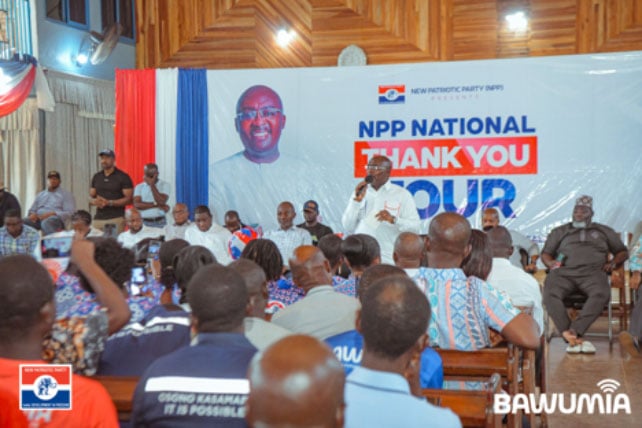Dr. Mahamudu Bawumia, the New Patriotic Party’s (NPP) flagbearer for the 2024 elections, embarked on a “Thank You Tour” across the Bono Region to express gratitude to party loyalists for their efforts in the previous election cycle. During his tour, he addressed several key issues, including the resurgence of power outages, unfulfilled promises by the incumbent government, and the reasons behind the NPP’s loss in the 2024 general election. He strongly refuted claims that his religious background played a role in the party’s defeat, attributing the loss primarily to voter apathy within the NPP’s base.
Bawumia criticized the John Mahama administration for the return of “dumsor,” the term used to describe the erratic power supply that plagued Ghana in previous years. He accused the government of backtracking on numerous campaign promises, including increasing cocoa farmer payments and abolishing licensure examinations for certain professions. He highlighted the irony of the administration’s focus on terminating appointments made since 2017, while neglecting their initial pledges. This, he argued, demonstrates a disconnect between the government’s rhetoric and its actions.
The “Thank You Tour” provided a platform for Bawumia to consolidate party unity. He emphasized the inclusive nature of the tour, noting the presence of all former flagbearer primary contenders, signifying a united front as the party looks ahead to the 2024 elections. He expressed gratitude to all party members, from grassroots organizers to senior leadership, for their dedication and hard work during the previous campaign. This tour served as not only a gesture of appreciation but also a strategic move to galvanize the party base and prepare for the upcoming electoral contest.
Bawumia vehemently dismissed the notion that his Muslim faith contributed to the NPP’s defeat. He referenced specific constituencies where Muslim candidates, including himself, secured victories, arguing that if religion were a decisive factor, the outcome in constituencies with predominantly Christian populations would have been different. He presented data showing he garnered more votes than some Christian parliamentary candidates in these areas, further strengthening his argument against the religion-based narrative. He pointed to examples such as Sunyani East and Wenchi, constituencies won by Muslim MPs, and highlighted his own performance in Assin North, where he secured more votes than the NPP’s Christian parliamentary candidate, Ntim Fordjour.
Instead of religious factors, Bawumia pinpointed voter apathy within the NPP as the primary reason for their electoral loss. He cited research indicating that approximately 2.1 million NPP voters stayed home on election day, while Mahama’s margin of victory was 1.7 million votes. He argued that had these voters participated, the NPP would have secured victory. He stressed that the National Democratic Congress (NDC) did not experience a significant increase in their vote share; rather, the NPP’s loss stemmed from their own supporters’ failure to cast their ballots. This analysis underscores the importance of voter mobilization for the NPP in future elections.
Looking forward, Bawumia affirmed the NPP’s determination to regain power in the 2024 elections. He emphasized the party’s commitment to addressing the needs of the Ghanaian people, particularly in the area of job creation. He acknowledged the economic challenges facing the country and pledged that the NPP, if elected, would prioritize policies aimed at stimulating employment opportunities. This focus on employment reflects an understanding of the pressing economic concerns of the populace and positions job creation as a central pillar of the NPP’s future platform. This strategic focus on employment underscores Bawumia’s recognition of the economic anxieties prevalent among the electorate and aims to position job creation as a cornerstone of the NPP’s platform in the upcoming election cycle. He aims to convince Ghanaians that the NPP is better equipped to manage the economy and create job opportunities compared to the incumbent administration.














